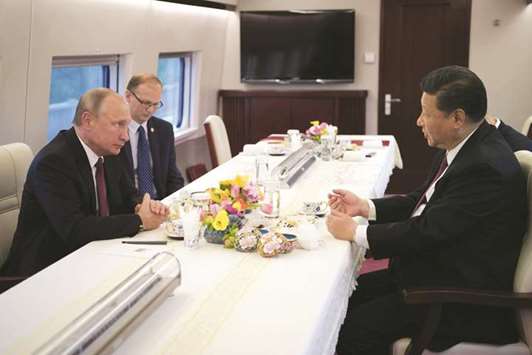China’s “highest honour” is bestowed on foreigners who have made “outstanding contributions” to the country’s modernisation drive and helped maintain world peace, Xi said. “This medal of friendship represents the Chinese people’s lofty respect for President Putin, and symbolises the profound friendship between China and Russia,” he said.
The most powerful Russian and Chinese leaders in decades, Putin and Xi have forged closer ties as US President Donald Trump has labelled both countries economic rivals that challenge US interests and values. Before the medal ceremony, Putin said the two heads of state had enjoyed “fruitful” talks.
“The relationship between Russia and China is a friendly, neighbourly one, developing... in the spirit of overarching strategic partnership,” he said. The two leaders later attended a youth ice hockey game in the coastal city of Tianjin.
Analysts remarked on their similar leadership styles. Xi and Putin are “soulmates who want to make their countries great again”, Alexander Gabuev, senior fellow at the Carnegie Moscow Center, told AFP.
“Both share scepticism towards American hegemony and distrust US intentions, both are authoritarian personalistic rulers,” he said. Putin was re-elected to a fourth Kremlin term in March.
That same month, Xi was given a path to indefinite rule when the the Communist-led rubber-stamp parliament lifted presidential term limits.
China is mired in tough negotiations with the United States to avoid a trade war, while Moscow has deep differences with Washington on multiple diplomatic fronts, including Syria and Ukraine.
“We both believe that the current trade protectionism has increased, and there are many uncertainties in the recovery of the world economy. Economic globalisation and regional economic integration are the trend of the times,” Xi said. Putin noted that bilateral trade between Russia and China hit $87bn last year and rose by 31% in the first quarter of this year.
“If we are able to keep up this rate of growth we may be able set a record at the level we discussed achieving over the period of several years — $100 billion,” Putin said. Putin played up his bond with “good friend” Xi in an interview with China’s state broadcaster CGTN this week.
He said the Chinese president was the only state leader to have celebrated his birthday with him. Xi “is approachable and sincere”, Putin told CGTN. “But he’s also a very dependable man to work with.” Putin told reporters yesterday that the two leaders had discussed the situation on the Korean peninsula. “It is positive that the inter-Korean negotiations which have begun are moving along the lines of the Russian-Chinese roadmap for resolving the Korean situation,” he said.
“Recent Russian-North Korean contacts confirm the willingness of Pyongyang to work constructively,” he added. Russia supports China’s proposal for a “suspension-for-suspension” approach that calls for North Korea to stop its nuclear and missile testing in exchange for a halt to joint military exercises between the US and South Korea. Putin also said they discussed Iran but didn’t provide details.
Maria Repnikova, director of the Center for Global Information Studies at Georgia State University in the US, said China makes Russia look “stronger and more relevant” on the global stage.
For its part, Russia allows China to show the US that it has “other options” in international negotiations, she said.
“Trump’s policies justified (the) growing closeness, especially for Russia but also for China given the volatile relationship with the United States,” Repnikova told AFP.
But, she said “it’s an asymmetrical relationship with Russia more dependent on China than vice versa, especially in the economic sphere”.
After the Beijing visit, Putin will join Xi at a weekend summit of the Shanghai Co-operation Organisation (SCO) in the eastern Chinese city of Qingdao. China and Russia lead the regional security group, which includes former Soviet states and new members India and Pakistan.
Putin told CGTN that the SCO had “small” objectives when it was founded two decades ago but that it was now evolving into a larger global force. Iranian President Hassan Rouhani, whose country is an observer member of the SCO, will also attend the summit at a time when China and Russia are seeking to save the Iran nuclear deal following Trump’s withdrawal from the pact.

